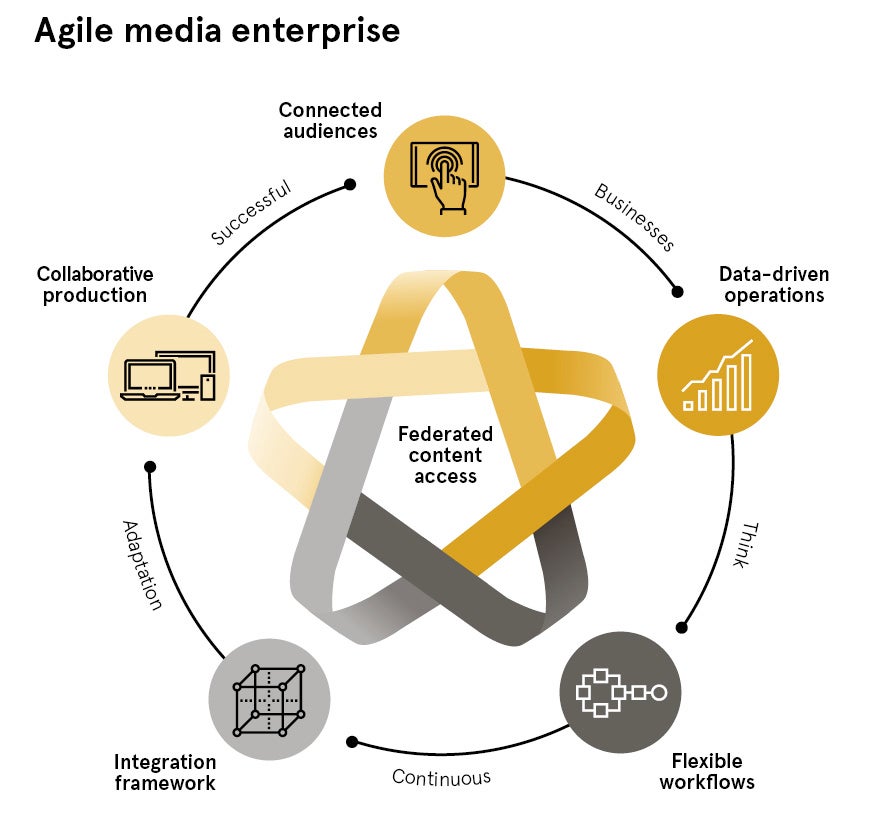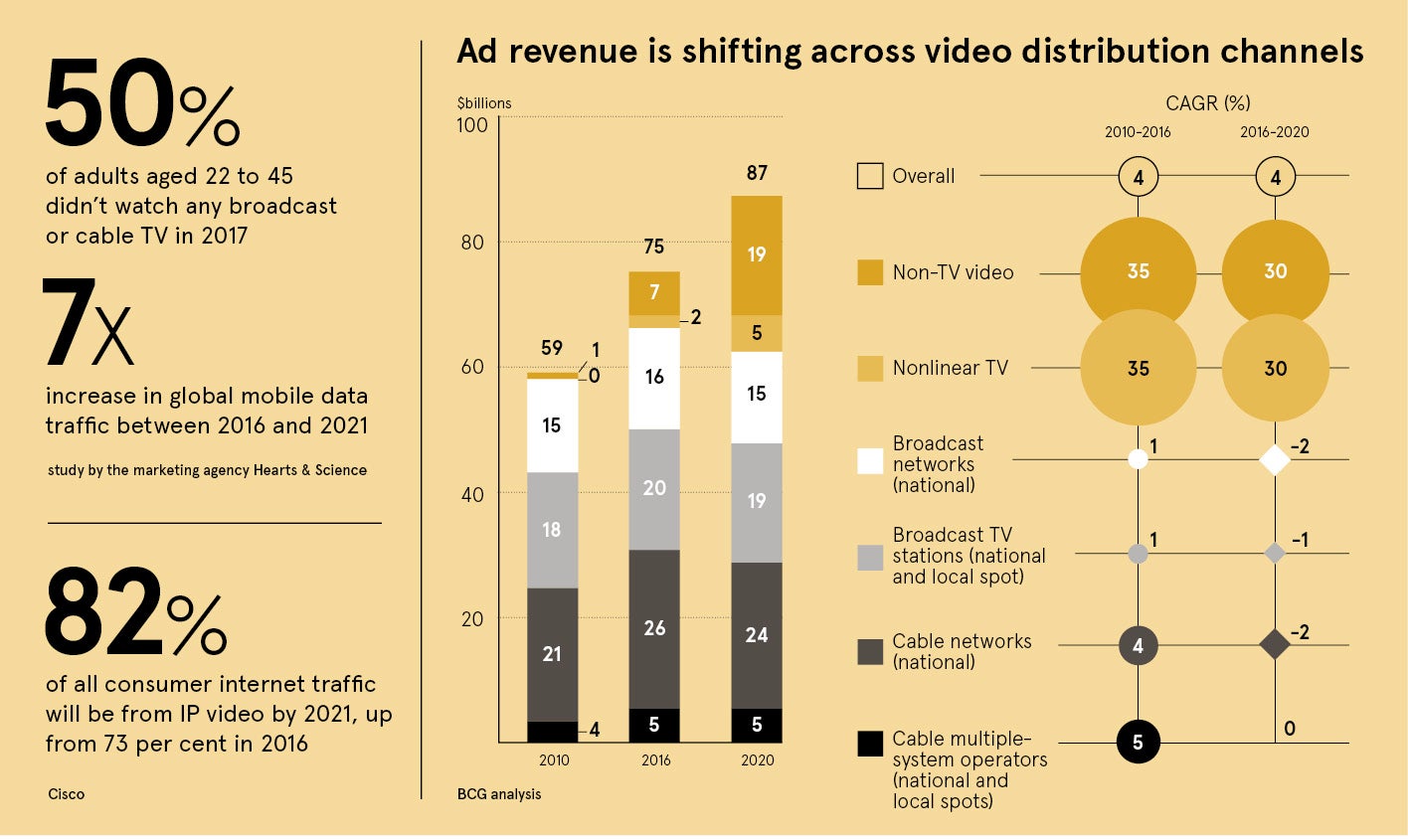New media and entertainment players are rising and scaling rapidly, disrupting entire market segments. Agile on-demand streaming services, such as Netflix and Red Bull TV, bring a data-driven and direct-to-consumer approach that allows them to respond faster and better to audience expectations. Their innovative offers create entire new markets and consumption models.
Social media titans, such as Facebook, YouTube and Twitter, boast advanced technology platforms and massive financial resources. They are also actively engaging in ambitious content strategies. The potency and reach of social media, with its wealth of data, ought to be leveraged. Social channels present a unique opportunity for media players to further their reach, connect with new audiences, deliver complementary experiences, and gather precious data and analytics.
“This is a new set of complex, and changing, rules for the media industry,” says Arnaud Elnecave, vice president of marketing at Dalet Digital Media Systems, a leading technology and service provider that offers a media workflow platform with more than 70,000 users, including BBC, Fox Networks Group and NBCUniversal, powers 900 customer sites and thousands of channels.
Advances in technology, notably artificial intelligence (AI) and cloud, will help forge new paradigms, and power business and operational models that were not previously viable. Quickly embracing new technologies is imperative.
“The building blocks remain the same: content, operations and audiences. But everything that binds them and anything in between is being reshuffled. The ability to react faster and adapt continuously to market shifts is becoming critical,” says Mr Elnecave
“Proactive, continuous business transformation and faster adaptation is key to succeed in today’s competitive environment, and to avoid being disrupted in an age of relentless innovation. This starts with a strategic investment in an open, agile technology platform with core workflow orchestration capabilities that enables them to build a cohesive and agile digital media supply chain.”

Source: Dalet
The Dalet Galaxy platform federates and streamlines the content chain by managing assets, metadata, workflows and processes across all production systems and distribution systems.
The company recently introduced Dalet Media Cortex, a framework that connects and orchestrates AI and machine-learning models at every level of the enterprise content supply chain and media operations.
“Designed specifically to bring the best value from AI to media businesses, this framework enables key AI-infused functions, such as automatic content indexing, topic extraction and content discovery, recommendation optimisation and predictive analytics,” he explains.
“Ultimately it allows our customers to augment team workflows and collaboration, further empower top creatives and editors, automate more complex chains of processes, boost content performance and recommendation, and optimise provisioning with prediction to lower total costs of operations.”
Dalet also fully supports Amazon Web Services, so customers can leverage cloud computing and storage for more flexibility, dynamic scaling and seamless collaboration across multiple locations.
“Businesses need to adapt faster, and this is often achieved by trying more and failing faster,” says Mr Elnecave. “The cloud offers this financial paradigm. New products, services and content formats can be easily trialed with limited investment, and immediately scaled if successful.”

In 2018, an agile media enterprise requires a platform, data strategy and comprehensive operations management. When combined this enables the organisation to connect better with its audience, monitoring and describing them better, and personalise the viewer’s experience by leveraging data.
“New forms of content, generated with efficient multiplatform productions and designed for cross-channel, complementary experiences, drive better engagement,” says Mr Elnecave. “The ability to efficiently localise, customise and refine the content to effectively align it with the audience’s expectations is key. Personalised and more subtle digital advertising, such as dynamic, targeted product placement, is only a matter of quarters away.”
Media organisations can redefine their business by using that data, be it for advertising, subscriptions, content licensing or other forms of revenues.
Dalet, with almost 100 third-party tech partners in its ecosystem, has opened up the digital media supply chain. This enables and encourages clients to take advantage of the latest technologies as soon as they become available, increase collaboration, build competitive advantages and operate more dynamically.
Further, the Dalet platform leverages efficient, component-based workflows, so content does not have to be rendered at every stage of its life cycle. For media organisations, this approach significantly speeds up processes, facilitates complex and mass content volume workflows, such as international versioning and multiplatform content distribution, optimises operating costs and enables better collaboration. This will ultimately reduce the industry’s overall storage and compute footprint, which is a good thing for the planet.
A specialist platform such as Dalet’s is vital for business leaders striving to build a truly agile, data-driven media organisation
Clearly, a specialist platform such as Dalet’s is vital for business leaders striving to build a truly agile, data-driven media organisation that innovates continuously, connects directly with its audiences, and offers them new formats and experiences.
For others outside the media industry, it will also soon be necessary, predicts Mr Elnecave. “Until now Dalet has been dedicated to professional media producers and distributors as customers, but we are starting to see a new convergence on the horizon,” he says. “Large corporations, government agencies, international and educational organisations, as well as every entity that needs to manage media at scale ends up requiring a complex and integrated media supply chain – and a platform like ours to power their next generation of storytelling and content operations.”
Dalet helps a growing number of leading media companies define, plan and execute their strategic transformations. Most recent examples include Euronews, which revamped their entire operations to enable a new generation of content customisation and adaptation for multicultural audiences, and CNNMoney Switzerland, which launched a premium multiplatform brand in a matter of weeks, supporting an aggressive time-to-market requirement without compromising on quality.
“Time is of the essence,” Mr Elnecave concludes. “For the organisations that adapt and reinvent themselves fast enough, there is a world of opportunities in the fast-shifting media landscape. For those that don’t, everything will keep becoming more of a threat. And the longer it takes to execute on the next iteration, the less revenue they will have from the legacy business to fund the next ambitions.”
Going further please log on to Euronews customer story at www.dalet.com/customer-stories/euronews and CNNMoney Switzerland customer story at www.dalet.com/customer-stories/cnnmoney-switzerland
or Dalet at www.dalet.com


A specialist platform such as Dalet’s is vital for business leaders striving to build a truly agile, data-driven media organisation
